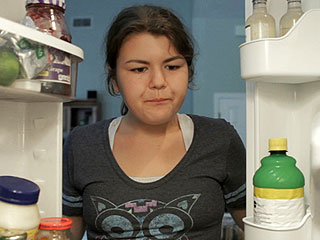
Bite Size (2014) / Documentary
MPAA Rated: Not rated, but I'd rate it PG for thematic material and some violent video game images
Running time: 90 min.Cast: Davion Bland, KeAnna Pollard, Emily Patrick, Moy Gutierrez, Lisa Ross
Director: Corbin Billings
Review published March 8, 2015
 Bite Size is a documentary exploring the
massive problem of childhood obesity in the United States.
Spotlighting the lives of four such tween-aged kids from different
walks of life, the doc, directed by Corbin Billings, demonstrates how
the problem exists in many places, and in many situations.
Bite Size is a documentary exploring the
massive problem of childhood obesity in the United States.
Spotlighting the lives of four such tween-aged kids from different
walks of life, the doc, directed by Corbin Billings, demonstrates how
the problem exists in many places, and in many situations.